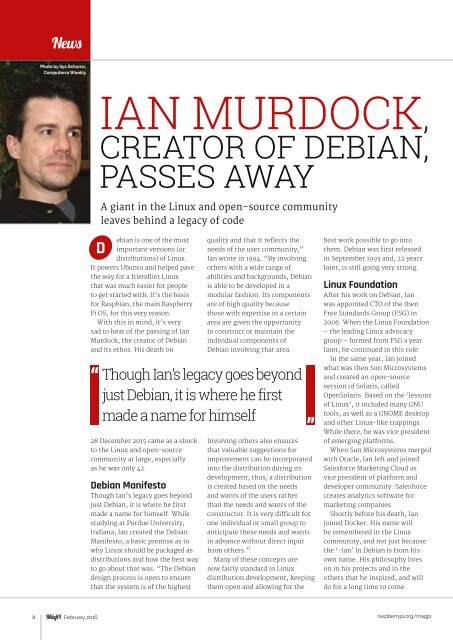You also want an ePaper? Increase the reach of your titles
YUMPU automatically turns print PDFs into web optimized ePapers that Google loves.
News<br />
FEATURE<br />
Photo by Ilya Schurov,<br />
Computerra Weekly<br />
IAN MURDOCK,<br />
CREATOR OF DEBIAN,<br />
PASSES AWAY<br />
A giant in the Linux and open-source community<br />
leaves behind a legacy of code<br />
D<br />
ebian is one of the most<br />
important versions (or<br />
distributions) of Linux.<br />
It powers Ubuntu and helped pave<br />
the way for a friendlier Linux<br />
that was much easier for people<br />
to get started with. It’s the basis<br />
for Raspbian, the main Raspberry<br />
Pi OS, for this very reason.<br />
With this in mind, it’s very<br />
sad to hear of the passing of Ian<br />
Murdock, the creator of Debian<br />
and its ethos. His death on<br />
28 December 2015 came as a shock<br />
to the Linux and open-source<br />
community at large, especially<br />
as he was only 42.<br />
Debian Manifesto<br />
Though Ian’s legacy goes beyond<br />
just Debian, it is where he first<br />
made a name for himself. While<br />
studying at Purdue University,<br />
Indiana, Ian created the Debian<br />
Manifesto, a basic premise as to<br />
why Linux should be packaged as<br />
distributions and how the best way<br />
to go about that was. “The Debian<br />
design process is open to ensure<br />
that the system is of the highest<br />
quality and that it reflects the<br />
needs of the user community,”<br />
Ian wrote in 1994. “By involving<br />
others with a wide range of<br />
abilities and backgrounds, Debian<br />
is able to be developed in a<br />
modular fashion. Its components<br />
are of high quality because<br />
those with expertise in a certain<br />
area are given the opportunity<br />
to construct or maintain the<br />
individual components of<br />
Debian involving that area.<br />
Though Ian’s legacy goes beyond<br />
just Debian, it is where he first<br />
made a name for himself<br />
Involving others also ensures<br />
that valuable suggestions for<br />
improvement can be incorporated<br />
into the distribution during its<br />
development; thus, a distribution<br />
is created based on the needs<br />
and wants of the users rather<br />
than the needs and wants of the<br />
constructor. It is very difficult for<br />
one individual or small group to<br />
anticipate these needs and wants<br />
in advance without direct input<br />
from others.”<br />
Many of these concepts are<br />
now fairly standard in Linux<br />
distribution development, keeping<br />
them open and allowing for the<br />
best work possible to go into<br />
them. Debian was first released<br />
in September 1993 and, 22 years<br />
later, is still going very strong.<br />
Linux Foundation<br />
After his work on Debian, Ian<br />
was appointed CTO of the then<br />
Free Standards Group (FSG) in<br />
2006. When the Linux Foundation<br />
– the leading Linux advocacy<br />
group – formed from FSG a year<br />
later, he continued in this role.<br />
In the same year, Ian joined<br />
what was then Sun Microsystems<br />
and created an open-source<br />
version of Solaris, called<br />
OpenSolaris. Based on the ‘lessons<br />
of Linux’, it included many GNU<br />
tools, as well as a GNOME desktop<br />
and other Linux-like trappings.<br />
While there, he was vice president<br />
of emerging platforms.<br />
When Sun Microsystems merged<br />
with Oracle, Ian left and joined<br />
Salesforce Marketing Cloud as<br />
vice president of platform and<br />
developer community. Salesforce<br />
creates analytics software for<br />
marketing companies.<br />
Shortly before his death, Ian<br />
joined Docker. His name will<br />
be remembered in the Linux<br />
community, and not just because<br />
the ‘-ian’ in Debian is from his<br />
own name. His philosophy lives<br />
on in his projects and in the<br />
others that he inspired, and will<br />
do for a long time to come.<br />
8 February 2016<br />
raspberrypi.org/magpi


